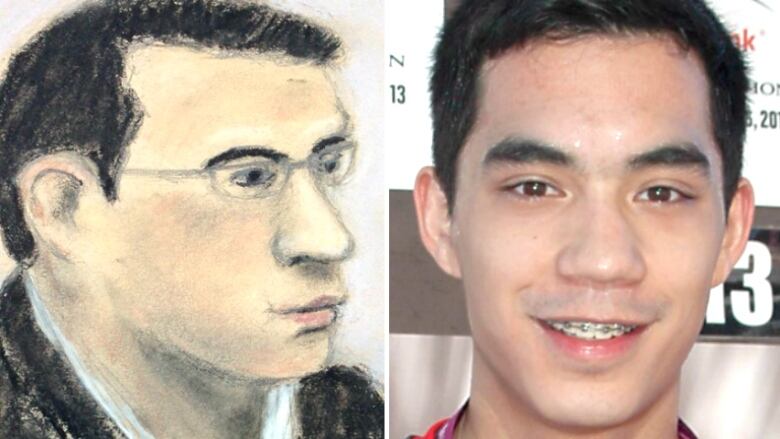Matthew de Grood's murder trial adjourns, judge to deliver decision Wednesday
Calgarian stabbed Lawrence Hong, Joshua Hunter, Kaitlin Perras, Zackariah Rathwell, Jordan Segura at party

Matthew de Grood's quintuple murder trial wrapped up Tuesday, with lawyers for the Crown and defence agreeing the Calgary man was in a psychotic state and unable to distinguish right from wrong when he stabbed five young people to death at a party in 2014.
"I agree the accused was suffering psychosis" Crown attorney Neil Wiberg said in his closing argument.
"The Crown concedes he was incapable of knowing his acts were morally wrong."
- Why Mathew deGroodis unlikely to be convicted of murder
- 'Everybody's a loser in this case,' prosecutor says
De Grood has admitted to stabbing Lawrence Hong, 27, Joshua Hunter, 23, Kaitlin Perras, 23, Zackariah Rathwell, 21, and Jordan Segura, 22, at a party in the Brentwood neighbourhood in April 2014.
But he pleaded not guilty to five first-degree murder charges.
The Crown noted the "brutality and ruthless efficiency" with which de Groodcarried out the killings.
"The psychotic episode, which affected his mind, did not reduce his effectiveness as a killing machine," Wiberg said.
Justice Eric Macklinadjourned the trial until Wednesday at 10 a.m. MT, when he will deliver his decision.
Follow the trial live via our reporters in the courtroom:
DefencelawyerAllan Faypresented evidence that de Grood didn't know that what he was doing when he stabbed the victims was morally wrong, because he was psychoticat the time.
Fay argued that de Grood should befoundnot criminally responsible.
"I personally think the evidence is overwhelming," Fay told the media outside of court after his final witness testified.
De Groodbelieved he was at war with vampires and werewolvesand had to kill before he was killed, one of the psychiatrists testified.
Last week, court heard evidence thatde Groodsent ominous messages in the hours before the killings and told friends at the party that he thought the end of the world was imminent.
- 'Uniqueirregularities' at trial applauded by legal expert
- DeGrood'clearly was psychotic,' psychiatrist testifies
'Always a search for the truth'
Court also heardde Grood talked about conspiracy theories, hidden meanings in songs, patterns in the Matrix movies and spoke of U.S. President Barack Obama being "the Antichrist" while on his way to and at the party.
De Grood's father, a 30-year veteran of the Calgary Police Service, considered swearing a mental health warrant in the days before the killings as he and his wife became increasingly concerned about their son's apparently deteriorating mental health, according to an agreed statement of facts read into the court record.
If deGroodis found not criminally responsible by the court, hewould be sent to a psychiatric facility rather than a prison.
The Alberta Review Board would then be tasked with reviewing de Grood's treatment and progress annually to determine what, if any freedoms he would be allowed, including whether in the future he can be released into the community.
"I think a trial is always a search for the truth, and so the end result is to get at the truth," said prosecutor Wiberg, who wouldn't say if he would be arguing against a finding of not criminally responsible.

Another unknownis whether the Crown prosecutor will pursue a "high-risk" designation.
Typically, patients are reviewed annually, but in the case of the high-risk designation, people can go three years between reviews.
Jordan Segura's mother, Patty Segura, told CBC News it has been a "horrible" experience to be in the courtroom for the past week.
"It's just a waste of time, because it's quite obvious what happened, so I don't know why we need to sit in court," she said.
On the final day of testimony, Wiberg said he doubts the victims' families will ever get over the loss of their loved ones.
"It's horribly difficult. It's horribly difficult," said Fay. "So many young lives wiped out in those events."
- Accused thought he was alien fighting vampires, court hears
- 'Sleep tight, little bear': Families of victims present tributes
Get the latest breaking news on this story. Download the CBC News app foriOSandAndroid.












_(720p).jpg)


 OFFICIAL HD MUSIC VIDEO.jpg)
.jpg)



























































































